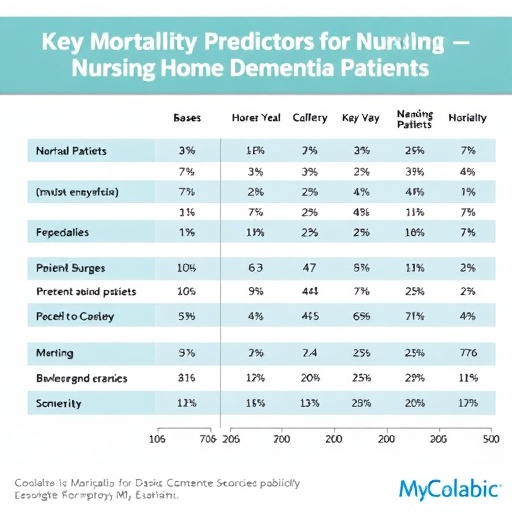In a groundbreaking study shedding light on a deeply concerning issue in our aging society, researchers led by Wang et al. have explored the factors influencing mortality among individuals suffering from advanced dementia who reside in nursing homes. This prospective cohort study, published in BMC Geriatrics, presents critical insights that could transform how healthcare professionals assess and manage the care of these vulnerable individuals.
Among the myriad of challenges faced by those dealing with advanced dementia, understanding mortality predictors is crucial. The elderly population, particularly those in nursing homes, is at a heightened risk of complications that can lead to premature death. The study identified several key prognostic indicators that are essential for healthcare providers to consider in providing appropriate interventions and establishing realistic expectations for patients and their families.
One of the primary findings of the study emphasizes the role of physical health status at the time of evaluation. Comorbid conditions, particularly cardiovascular and respiratory diseases, were found to significantly correlate with reduced survival rates in advanced dementia patients. As such, this underscores the importance of comprehensive health assessments that factor in not only the neurological aspects of dementia but also the patient’s overall medical conditions.
Furthermore, the investigators highlighted the significance of cognitive function as a prognostic predictor. Interestingly, individuals with preserved cognitive abilities, even within the advanced stages of dementia, demonstrated better survival odds compared to those who were more cognitively impaired. This finding raises important questions regarding the nature of cognitive decline and its relationship with physical health and the overall quality of care received in nursing homes.
Moreover, the researchers underscored the influence of social factors in the study. The presence of social support—such as regular visits from family members and involvement in community activities—emerged as a critical predictor of higher survival rates. This reveals not only the emotional importance of social connections for individuals with dementia but also suggests that enriching the social environment of nursing homes could potentially enhance the quality of life and prolong survival.
The study’s methodology involved a rigorous examination of a large cohort of nursing home residents diagnosed with advanced dementia. The longitudinal approach allowed the team to monitor changes over time carefully, thus providing a comprehensive understanding of the factors influencing mortality. This methodological rigor adds credibility to their findings and offers a framework for future research in this vital area of geriatrics.
While the findings of this study are indeed significant, they also prompt a larger conversation regarding the need for systemic changes in how nursing homes operate. The results advocate for enhanced training and awareness among caregivers and medical personnel regarding the multifactorial nature of dementia care. By understanding these prognostic factors, care providers can make more informed decisions that directly impact patient outcomes.
Additionally, the challenges surrounding end-of-life care for dementia patients cannot be overstressed. The insights gained from this study not only promote better clinical practices but also urge policymakers to consider reforms that support improved palliative care options in nursing homes. There is an urgent need to develop protocols that prioritize the dignity and comfort of patients as they navigate the complexities of advanced dementia.
As the aging population continues to grow, the necessity for robust research such as this becomes even more pressing. It is crucial to build upon these findings, advancing our knowledge regarding the intricate interplay between dementia, physical health, and social dynamics. Future studies should look to incorporate diverse populations to enrich understanding and ensure that findings are applicable across different demographic groups.
In conclusion, the work done by Wang and colleagues represents a significant leap forward in understanding the dynamics surrounding mortality in advanced dementia among nursing home residents. By pinpointing key prognostic indicators, this research lays the groundwork for improved care strategies that not only aim to extend life but also enhance the quality of those remaining years. It challenges us to rethink how we approach dementia care in institutional settings, emphasizing the need for holistic, patient-centered care that acknowledges both physical and emotional well-being.
In light of these findings, it is imperative for families, caregivers, and healthcare systems to embrace the insights shared in this study. Understanding the multifaceted nature of mortality predictors in advanced dementia presents an opportunity to not only save lives but also to significantly improve the quality of life for one of society’s most vulnerable populations, underscoring the responsibility we share in caring for those affected by this challenging condition.
Subject of Research: Prognostic predictors of mortality among individuals with advanced dementia residing in nursing homes.
Article Title: Prognostic predictors of mortality among individuals with advanced dementia residing in nursing homes: a prospective cohort study.
Article References:
Wang, J., Wang, X., Zhuo, Y. et al. Prognostic predictors of mortality among individuals with advanced dementia residing in nursing homes: a prospective cohort study. BMC Geriatr 25, 796 (2025). https://doi.org/10.1186/s12877-025-06350-5
Image Credits: AI Generated
DOI: 10.1186/s12877-025-06350-5
Keywords: advanced dementia, mortality predictors, nursing homes, prognostic factors, cognitive function, social support.




